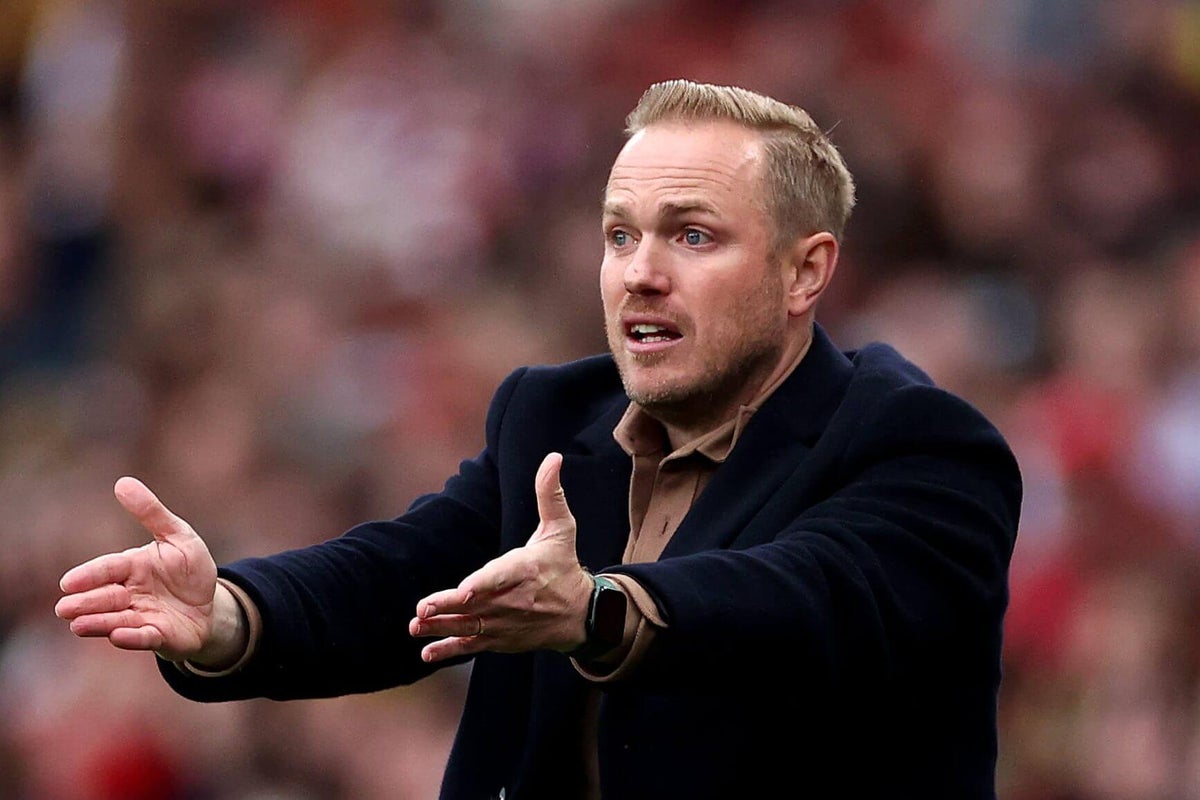The body language of the Arsenal players told a story. Specifically, how they were looking down, staring at the grass as Jonas Eidevall’s voice filled the space around them.
The 41-year-old was in full battle-cry mode. The Emirates Stadium was emptying. Chelsea had just finished handing Arsenal a 2-1 defeat in the Women’s Super League, condemning Eidevall’s side to just one point from nine across all competitions in the space of a week after a dismal goalless draw in the league with bottom-of-the-league Everton and a 5-2 defeat in the Champions League against Bayern Munich.
But the defeat by Chelsea felt terminal, soundtracked by boos as the visitors scored their second in the 16th minute and the hosts toiled to summon any effective response.
As the huddle ended, players and staff trickled out of it — slowly, glumly, world-class players full of swagger and attacking vigour reduced to muted melancholy.
Three days later, Eidevall was confirmed to have resigned from his post as Arsenal manager, as first reported by The Athletic.
The Swedish coach’s decision to walk away is the end of an enthralling, albeit short ‘will they, won’t they?’ saga regarding Eidevall’s future. A gigantic mocked-up P45 brandished around the stands will be a memorable image, alongside the words “Jonas Out” spray-painted by disillusioned fans along Hornsey Road outside the Emirates.
Eidevall, pictured during defeat by Chelsea, has resigned as Arsenal manager (Alex Burstow/Arsenal FC via Getty Images)
WSL managers have come under fire previously. Manchester City’s Gareth Taylor took himself off social media early in the 2021-22 season after City lost three of their first four league matches and were eliminated from the Champions League in the qualification process, with fans making their fury known.
But not since the departure of Pedro Martinez Losa from Arsenal in 2017 — after the Spaniard picked up four points from the first three games of the 2017-18 season — has a top-four WSL side parted ways with a manager so early in the season.
Some have expressed surprise at Eidevall’s departure. England manager Sarina Wiegman used the word “flabbergasted” in her squad announcement on Tuesday morning. Former Arsenal and England defender Anita Asante told Sky Sports she was “surprised by the timing”.
Assistant manager Renee Slegers, who will take interim charge of the team until a permanent replacement is found, said on Tuesday in Arsenal’s pre-Valerenga press conference she was “shocked and sad” when Eidevall shared with her his resignation plans on Monday.
There should be no surprise here, though.
The WSL’s increasingly competitive nature and the subsequent uptick in standards should make this decision quite predictable. At the risk of sounding trite, there was literal writing on a wall.
“Especially coming to a big club like Arsenal, definitely (expectations for managers] have changed,” Slegers said. “It comes with a lot of positives. The game is very big now, very alive. A lot of fans, people who engage with it. But it comes with pressure as well.”

(Marc Atkins/Getty Images)
Rarely had domestic women’s football in England felt more alive than during the latter stages of Eidevall’s tenure, the atmosphere reaching a dizzying, febrile height. Women’s football had arrived, even if watching the demise of a manager is never fun.
If there is any surprise felt here, it has less to do with Eidevall’s resignation and more to do with how women’s football has become ruthless in its standards — and that should be welcomed.
The unofficial slogan heading into Arsenal’s 2024-25 season was no more excuses. The exit of Emma Hayes from Chelsea to take charge of the USWNT meant the WSL champions were in active transition. With no summer tournament to contend with, Eidevall had proper preparation time. The injury crisis which gripped previous seasons finally looked to have abated. This was Arsenal’s best chance to end a five-year title drought and expand their trophy haul from two Continental Cups in three seasons.
Eidevall’s exit did not occur in a nine-day vacuum, but it can be epitomised by those days that led to it: a stodgy draw with Everton defined by another episode of how not to break down a low block; capitulation against Bayern Munich, who were more than happy to deliver a masterclass in execution; finally, a defeat by Chelsea featuring poor set-piece defending and a lack of penetration which conspired to form an all-too-familiar 90-minute blur.
The post-match assessments were copy-and-paste jobs. Eidevall’s inconsistent team selection, unconvincing tactics and management style have been called into question regularly. The team’s inefficiency in front of goal became its own pre-written match talking point. After Sunday, Arsenal’s expected goals (xG, a measure of chance quality) performance in the WSL sat at -3.0, the league’s lowest — in short, their xG tally suggests they should have scored seven times, but they have only scored four.
By the end, Eidevall’s team were being carried by individual performances, flashes of something brilliant within but the whole never adding up to the sum of the parts, despite Arsenal having assembled a team with some of Europe’s most talented players.
That Eidevall and Arsenal severed the chord so swiftly should be seen as a statement not only from the club but for the league as a whole. Eidevall could surely have been convinced to stay on for the Champions League group stage match against Valerenga on Wednesday, then the WSL match against West Ham on Sunday, but the evidence is the issues would have persisted.
Instead, the words on the wall have been read. No longer can clubs view their women’s teams as box-ticking enterprises, glancing over to confirm nothing has caught on fire but showing little concern for rumbles of discontent or sub-par performances on the pitch.
(Top photo: Ryan Pierse – The FA via Getty Images)

